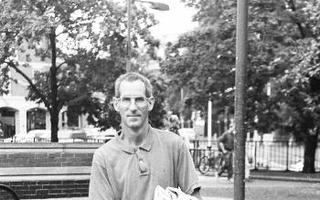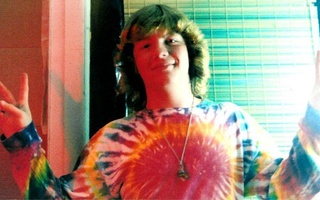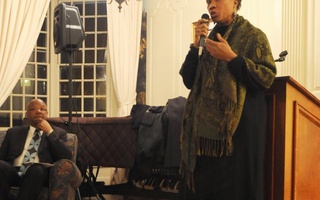Obviously every trip is entirely unlike every other. That's why we can say there are three kinds of trips. Harvard College divides all knowledge into three areas of study. Newspaper readers divide their interest between drugs, sex, and violence.
Newspaper readers are pretty astute. Drugs, sex, and violence is one expression of the human trinity. Logic, aesthetics, and metaphysics is another. "Violence" corresponds with "logics," "sex" with "aesthetics," "drugs" with "metaphysics." The system of violence and logic is the system of selfseeking as opposed to pleasureseeking or truthseeking. It is the system of society as opposed to nature or consciousness. The people in this system want to assert their egos. They want to gain control of the environment. They are ambitions. They want personal success. They are interested in politics as opposed to art or religion. They are good an running things. Their goal is securing power for themselves or their groups. They value autonomy. If they go to Radcliffe they are chocolates. They analyze the universe in terms of cause and effect. When they suffer it is because they can't control their emotions. Their crimes are crimes of violence. Their minds follow abstract "lines" of thought. They see existence as a struggle of equal and opposite forces. If they are turned off by middle class values they become radical fascists. If their thing is music they become The Monkees.
When people from this system take LSD they have a hard time. Their sanity is staked on their ability to control their existence. Their egos resist the disintegration of the everyday world. They try to rationalize what is happening and find they can't. The riot of the senses becomes terrifying. They struggle for control and finally panic.
Most acid trippers belong to the other two systems. They are pleasureseekers or truthseekers. Pleasureseekers like sex. If they are intellectual they are dilettantes and aesthetes. If they are anti-intellectual they can cook a good barbecued steak. They have a taste for the finer things in life. They like their comforts. They want to appease their egos. They want to groove on the environment. Their greatest fault is laziness. They fight movie censorship. They have warm friendships. They are tolerant and uncompetitive. They are creative and funny. Their goal is gratification of the senses. They like attention. At Radcliffe they are peaches. They suffer from not being able to satiate their desires. Their thinkers see the world as an endlessly complicated array of phenomena. Their criminals wander the streets at night looking for women to rape. They like symbolism. Their minds jump back and forth between various planes of thought. If they are teen-aged girls they hang around backstage after rock concerts. They drop out and live in communes. "Make Love Not War" was their idea.
Pleasureseekers have good trips. They know how to go with the flow. They have sensual, aesthetic experiences. They dig the colors. They have interesting thoughts. They maintain an equilibrium between themselves and the experience. Sometimes they can do this so well their best friends can't tell they're tripping.
The third system is difficult to describe. It is the system of consciousness as opposed to society or nature. The people in it want to know everything. They want to transcend their egos. They want to understand themselves perfectly. They try to be aware of all the forces acting on them. They like religion and philosophy. Their thinking goes in spirals around an idea. Enlightenment is their aim. Their failures enclose themselves in private worlds. They are tortured by doubt and guilt. "Feed Your Head" is their motto. Thty worry whether they are compromising their standards. If they despair, they become drug addicts or alcoholics.
Their trips are the best and the worse. As truthseekers they are caught in a paradox. The "truth" they want to find is the absolute certitude, the selfless peace, the eternal stillness of mystical ecstasy. But as long as they are "seeking," as long as they are desiring and striving for insights, as long as they are thinking and questioning, truth can only be relative. The medium is the message, Marshall McLuhan says. He means that we cannot help being affected by advertising no matter what our opinions about it, that television is important not for the content of its programs but for the way it makes us reorganize our behavior, that speech is important not for the ideas it expresses but for the way it affects the listener. In the same way, thinking itself is important not for its content but for the way it defines and limits us. When we are thinking we only know a few things in any given instant. We have to keep moving from thought to thought. This is similar to what Alpert, a truthseeker for years, finally realized about LSD. He saw that the experience was more important than the thoughts it generated. If he could stop planning his trips, if he could stop worrying about discovering the truth, if he could simply surrender himself to what was happening, then and only then he could know everything he ever wanted to.
Such perfect surrenders are difficult. They conflict with everything culture has taught us, and hasn't culture taught us everything? But once they happen the kingdom of heaven is ours. We not only see Good, we shine His shoes and scratch His back. We understand what it means to say that we are in the world and the world is in us. Earth, air, fire and water dissolve into pure energy. We know the future and the past, for they are now.
So total a loss of ego is a rare experience. Most people on spiritual trips remain aware of themselves as entities separate from other entities. They may even be thinking. Thinking is a non-spiritual activity, we have seen, but on a spiritual trip we can think and be peaceful at the same time. The difference between spiritual and aesthetic pleasure is hard to define. Suppose you are tripping happily on a song from an album. You're absorbed in the music. It's beautiful. The song comes to an end, and in the interval before the next song you think, "What a great song! What a great trip!" This is an aesthetic experience. The music is gratifying your ear. Now suppose you are tripping on the song without classifying it as "music." The interval between songs does not interrupt you pleasure at all. The silence is just as interesting as the sound, just as much a part of the cosmic rhythm. This is a spiritual experience.
When two people are sharing a spiritual trip they communicate by mental telepathy. Mental telepathy is pretty good, but it's nothing to really crow about. Bergson wrote about it. Jung used it in his notion of the collective unconscious. Probably everyone has had that kind of empathy with another person a few times in his life. Your own mind is so empty of struggle or desire that any movement by another person is instantly felt as your own. Your know he is going to blink his eyes before he does. You know when he wants a Coke. It can get boring.
The radio I am listening to has just interrupted the flow to inform me that thousands of young people are running around nude in an area adjacent to Palm Springs, California. They're probably experiencing something like mental telepathy. A police officer says the smell of marijuana is everywhere.
What goes up must come down, Whether people have nightmare or ecstasy trips, they return to normal consciousness and everyday anxiety. They begin to think about LSD and wonder what it means. Some decide it is harmful and warn their friends not to mess around with in. Some think it has damaged their minds and blame all their mental and physical failures in the next few years on it. Some think it is the answer to everything and decide their lives will be happy forever if they can take enough of it.
But all of them have seen the flip side of reality. If they can resist the tendency to explain away what has happeed, they feel a new freedom. Absolutists realize some part of the extent to which their own minds form the social reality they had accepted a given. "It's all in the mind!" they exclaim in surprise, like Alpert after he took psilocybin. Newtonian scientists become Einsteinian. Market accountants give up their jobs. Movie stars divorce their wives. Stolid consciousnesses dissolve. People realize how limited they are by emotions and desires. They realize how beautiful and interrelated the world is. They see in minute incidents allegories and metaphors for the life. Their lives become heroic and fabulous every minute. They see the reality is a myth. "Reality" "is" "a" myth." They begin to experience things rather than ask questions about them. They begin to irrationality. They change their ideas about "worth." They begin to depend on their own opinions about themselves. "I'm sorry I kicked you in the ass, but I'm not sorry I'm an ass-kicker," they say. "That's what I do. I kick people in the ass." They become interested in their own thoughts. They stop pursuing "goals," realizing that in order to pursue goals they have to anticipate, and anticipation is unreal. They see that anticipation depends on the use of words to manipulate symbols. Anticipation is the acting out of things in theory, of things that are not being apprehended by the senses. Anticipation deals in possibility, not reality, the possibility that the Russians will build a 70-million pound bomb in ten years so we better build an 8-million pound bomb now. Westerners' preoccupation with anticipation is reflected in the fact that the life insurance companies are the richest ones around. Money and anticipation, what more threatening combination of unrealities could be imagined?
This is what happened to Alpert and the people who started taking LSD early in the '60's. Where they had been self-seekers they became pleasure-seekers. They became tribal man as opposed to fragmented literate man. They lived in communes. They developed a new ethic of love and happiness. They became sensual and creative. They valued spontaneity over planning. They tried to live in the moment only and wholly.
But they ran into snags. They found that life was almost as difficult when they weren't high as it had been before they ever heard of LSD. They couldn't get enough pleasure. No matter how much they refined their desires they could never satisfy them. If they liked listening to music they couldn't stop at having a stereo. They had to have a better stereo. And then a better one. And then a better one. And then a better one. It was the trap of the subtle. the constant refinement of the senses along an asymptotic curve that approached nearer and nearer to the line but never got there, the predicament of the professor who is constantly improving and revising his theories but never can know it all, the predicament of Harvard and of Western society in general.
Read more in News
New Starters Lead Nine To 7-4 Win Over M.I.T.Recommended Articles
-
Rising State at HBS Opts Out of Rat RaceAt the end of Mark S. Albion's '73 first year at Harvard, his father came to visit him while attending
-
 A Roller-Coaster Year for Dining Halls
A Roller-Coaster Year for Dining Halls -
Golan to Donors: ’Tis Better To Give for the Arts Than To ReceiveWhen milling around outside his Wigglesworth Hall entryway one spring afternoon in 1975, first-year Jay E. Golan ’78 caught a
-
 Harvard, LSD, and the 1960s
Harvard, LSD, and the 1960s -
 Former Mayor Simmons To Run for Senate
Former Mayor Simmons To Run for Senate -
Need Help with Your Schedule?The entire drug classification system is archaic, unscientific, and rather harmful.













